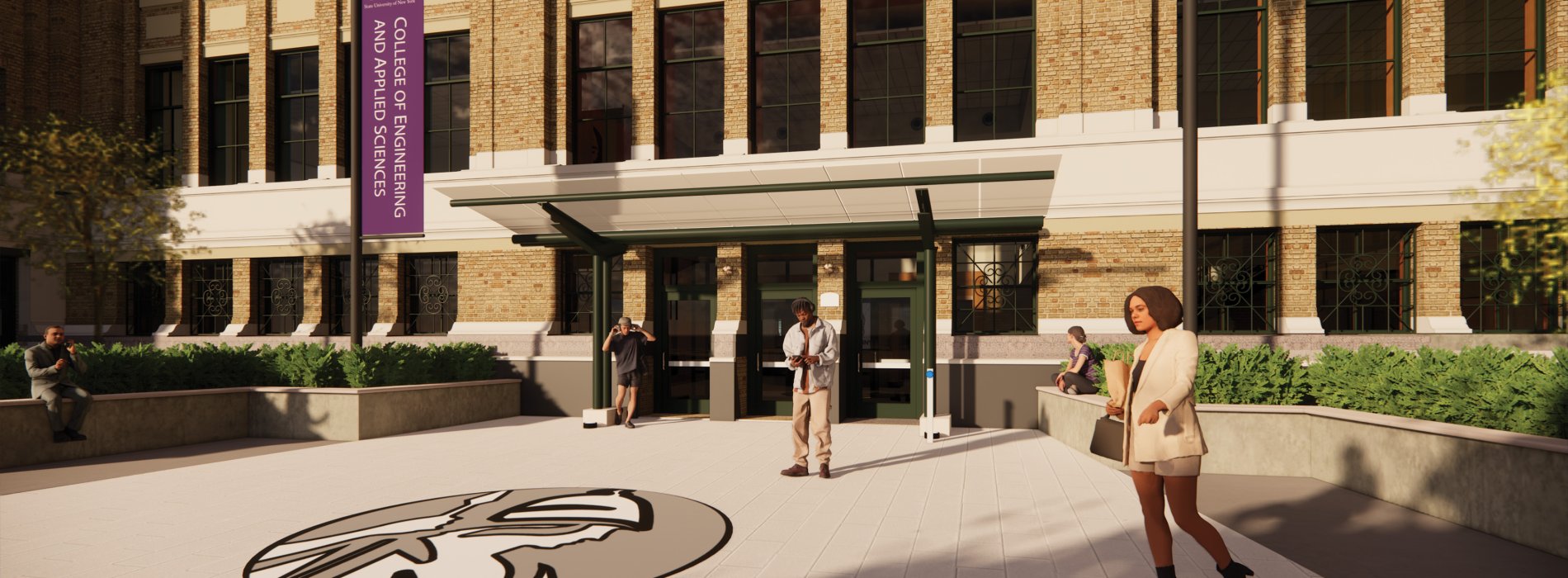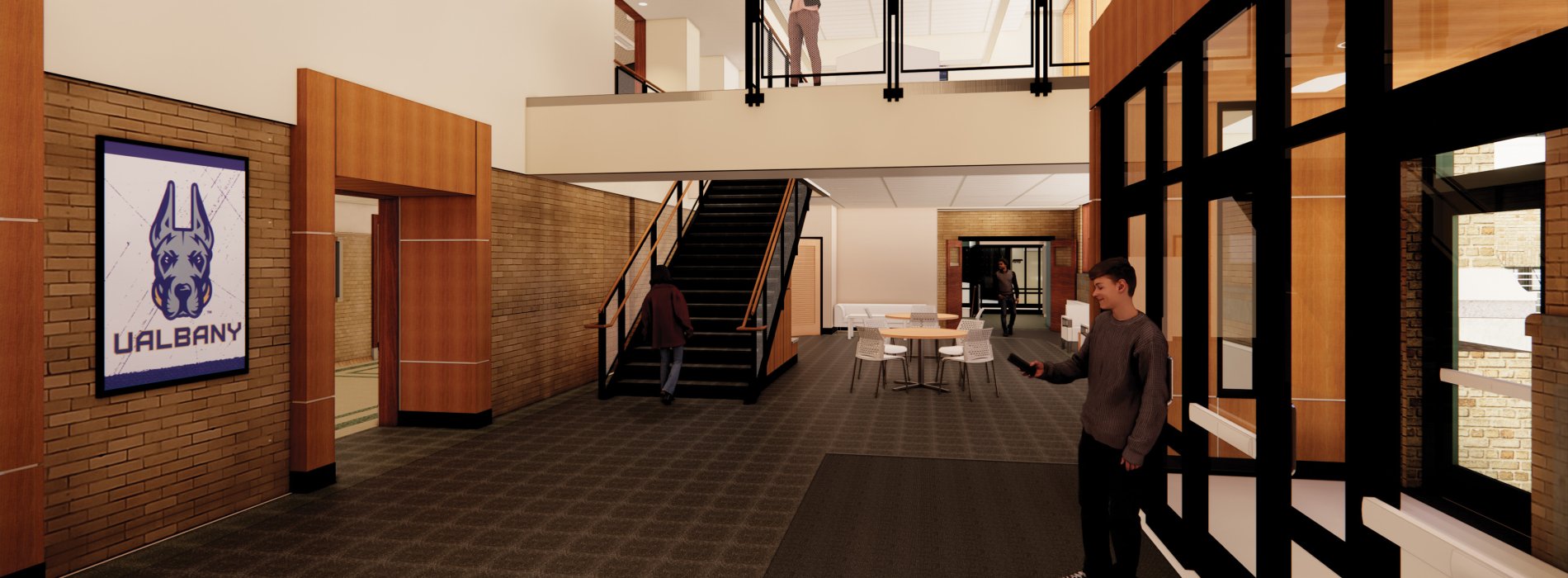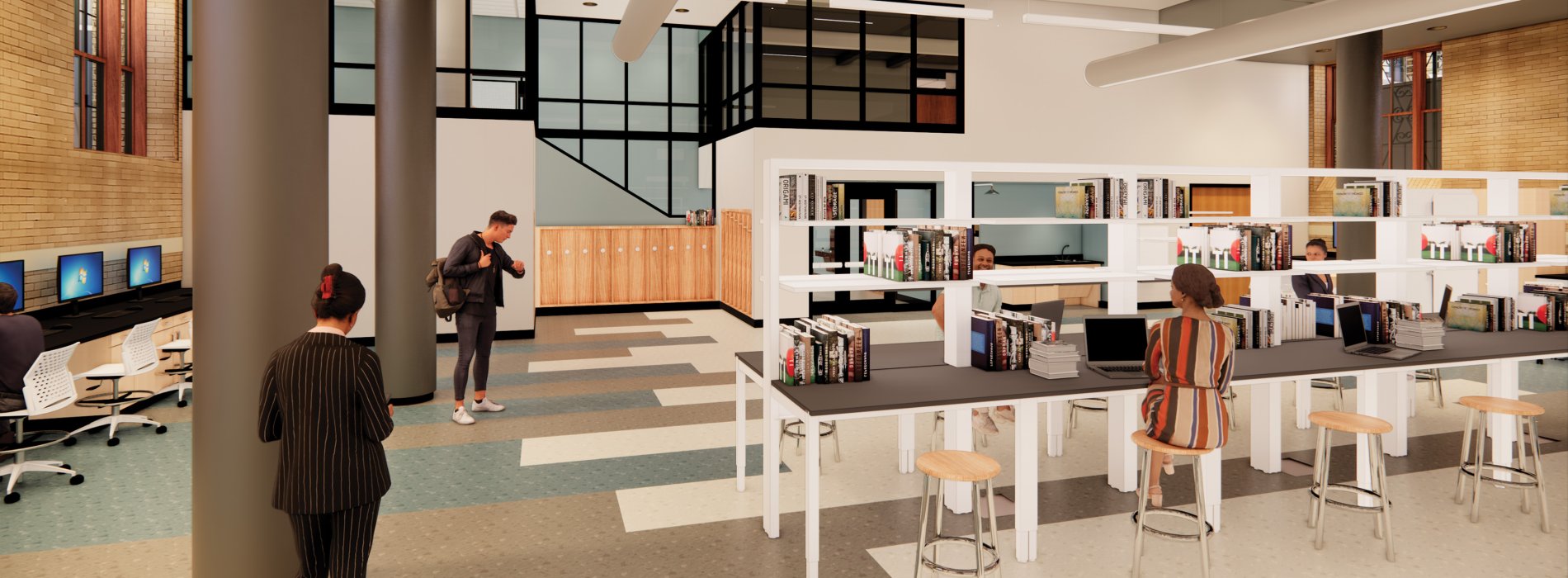UAlbany Engineering Building to Anchor New Artificial Intelligence Supercomputing Initiative
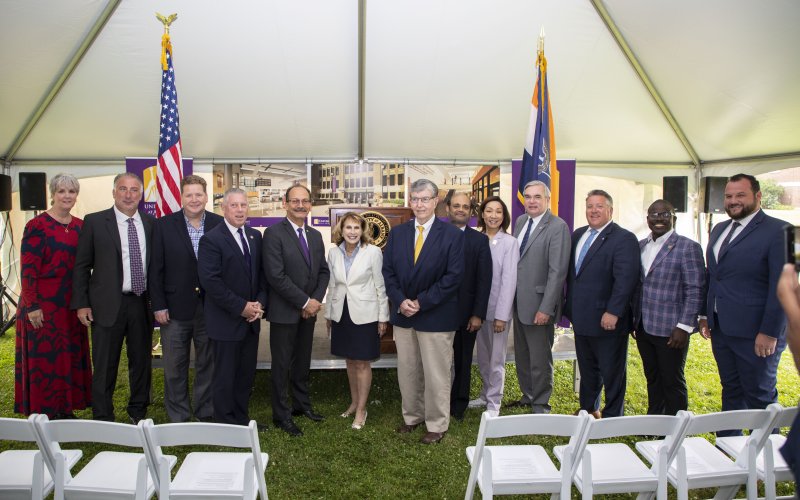
ALBANY, N.Y. (June 21, 2022) – The University at Albany today began a new era of teaching and research with the launch of Albany AI, a $200 million public-private supercomputing initiative based out of UAlbany’s soon-to-be-renovated College of Engineering and Applied Sciences (CEAS) building.
Buoyed by $75 million in state funding to complete the transformation of the former Albany High School into a state-of-the-art engineering college and fund the construction of a supercomputer, the Albany Artificial Intelligence Supercomputing Initiative (Albany AI) will significantly expand New York’s capacity in this major emerging field.
"My administration is steadfast in its commitment to transform SUNY into a globally renowned, 21st century education leader," Gov. Kathy Hochul said. "This funding will help drive economic revenue by attracting companies to New York's emerging advanced research centers, creating jobs and strengthening communities for decades to come."
With the goal of becoming the first university-based computer to reach a quintillion computations per second, Albany AI will empower university and industry researchers to harness massive data sets to better understand how to automate complex operations like diagnosing and treating disease and forecasting natural disasters. The research will focus on cybersecurity, weather prediction, health data analytics, drug discovery, next-generation microchip design and other applications essential to our health, security, resiliency and economic competitiveness. It will also involve important teaching and research collaborations with faculty in the humanities, social sciences, public policy, public health and social welfare as AI increasingly touches all facets of daily life.
Preserving a midtown Albany landmark
The completion of the engineering building, which will house Albany AI-related programs, is a critical step. The renovation will transform the 110-year-old former Albany High School on UAlbany’s Downtown Campus into modern labs and classrooms while preserving its core architectural elements. The revitalization of the vacant 129,000-square-foot building at Western and North Lake avenues is a major investment in midtown Albany, which UAlbany has called home for more than century.
SUNY Interim Chancellor Deborah F. Stanley said, "SUNY campuses are ever-evolving to meet the training requirements and rigorous research needs of the developing science, technology and engineering sectors. By investing in the new Albany Artificial Intelligence Supercomputing Initiative, we are showing our students that cutting-edge research is right here in our top-tier, affordable and accessible institutions. We thank Gov. Hochul and NYS Legislators Neil Breslin, Patricia Fahy, Michelle Hinchey and John MacDonald for this significant investment in New York's workforce, and we look forward to our students using these resources to develop sustainable solutions for generations to come."
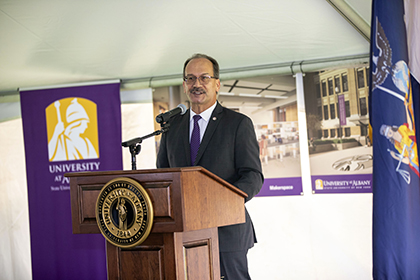
“UAlbany is uniquely positioned to leverage the promise and potential of artificial intelligence to tackle some of society’s biggest challenges, from climate change to public health to education,” said UAlbany President Havidán Rodríguez. “Not only is this a major milestone in UAlbany’s history – it also represents a significant step toward advancing Gov. Hochul’s vision to ensure SUNY is the premier public university system in the nation. We are grateful to the governor and the state Legislature, especially senators Breslin and Hinchey and assemblymembers Fahy and McDonald, for their unwavering support.”
Located in UAlbany’s Uptown Data Center, the Albany AI supercomputer will make computing clusters and exploratory hardware with the latest chip designs available to government, industry and university scientists across New York. This work will build on UAlbany’s existing research strengths, including collaborations like the recently announced partnership with IBM Research using AI to study water quality, weather prediction and renewable energy forecasting; the new Virtual Institute for Cyber Operations Research established in partnership with Florida International University and the Griffiss Institute; and a $20 million AI institute funded by the National Science Foundation in which UAlbany’s Atmospheric Sciences Research Center is a key partner.
Fueling academic collaborations well beyond STEM
The CEAS building, set for initial occupancy in late 2023 and full occupancy in 2025, will be a critical academic anchor for Albany AI, housing the core departments of Computer Science and Electrical and Computer Engineering. But Albany AI will touch all nine UAlbany schools and colleges. Through a pioneering initiative known as AI+X, UAlbany will make AI supercomputing resources available to every academic discipline, helping educate the next generation of AI-savvy New Yorkers in fields well beyond STEM.
UAlbany faculty in computer science, atmospheric sciences, mathematics, information security, electrical and computer engineering, public health, biological sciences, and emergency preparedness, homeland security and cybersecurity are already deeply involved in AI research. Their work is supported by the Department of Defense, the National Science Foundation, the National Institute of Justice and the U.S. Department of Energy, among others.
“This research requires a massive amount of computing power to process large volumes of data to arrive at conclusions that, for example, weather forecasters and emergency managers can trust,” said UAlbany’s Vice President for Research and Economic Development Thenkurussi Kesavadas. “Albany AI will provide the state-of-art, high-speed computational power needed to design the latest generation of semiconductors and to train and deploy new AI algorithms and machine-learning systems that will transform our approach to learning and fuel innovation.”
Integrating AI instruction across UAlbany’s academic programming
As part of the new initiative, UAlbany will launch an AI Academy to expand programs and other educational opportunities, including new minors in game design and machine learning, for students pursuing a broad range of careers involving artificial intelligence.
“We are poised to significantly invest in new faculty to teach and carry out research related to artificial intelligence,” said Provost and Senior Vice President for Academic Affairs Carol H. Kim. “Through AI+X, we will integrate AI instruction across our academic enterprise, including the humanities and arts, thereby ensuring our students are prepared for a future in which an understanding of AI will be invaluable in most careers.”
Senator Neil Breslin said, "Helping to secure $75 million for the University at Albany's Artificial Intelligence Supercomputing Initiative in the recently adopted budget was one of my top priorities. This public/private investment will be an economic driver here in the Capital Region and throughout New York State that will spark innovation in AI supercomputing."
Senator Michelle Hinchey said, “UAlbany’s AI Supercomputing Initiative will push the boundaries of scientific exploration to produce transformational discoveries that will help us address the leading challenges of our times, from predicting extreme weather brought on by the climate crisis to cybersecurity to cutting-edge healthcare advancements – and it’s all happening right here at UAlbany! It was an honor to be part of the Capital Region coalition that fought to deliver $75 million in state funding to help power this initiative and expand AI innovation in New York.”
Assemblymember Patricia Fahy said, “UAlbany continues to lead the Capital Region into the future in more ways than one. I was proud to secure the $75 million in this year’s state budget to help bring New York’s next-generation AI supercomputing infrastructure to UAlbany, cementing it as the regional and statewide institutional leader in the developing AI and supercomputing fields. Moreover, I look forward to seeing it serve as a catalyst for future economic development, growth, and innovation as our society progresses towards employing more and more AI technologies in areas of our everyday lives.”
Assemblymember John T. McDonald III said, "The Albany Artificial Intelligence Supercomputing Initiative funded through the NYS budget will advance the ability to use artificial intelligence supercomputing technology. I was proud to work with my Capital Region delegation colleagues to ensure that the funding secured in the budget will provide the resources for UAlbany to continue to be an innovator and leader in these emerging fields."
Albany County Executive Dan McCoy said, “The number of organizations utilizing artificial intelligence has more than tripled over just the last four years, and we will likely see that figure continue to grow rapidly. The University at Albany continues to show that it is at the forefront of some of the most consequential advances in modern sciences, and this AI supercomputing initiative is just the latest example. Investing in artificial intelligence will help us begin to tackle some of the most pressing issues we face as a society and allow us to reap the tremendous educational and economic rewards that come with it here in Albany County. I commend President Rodríguez and everyone involved in making this a reality.”
Albany Mayor Kathy Sheehan said, “UAlbany continues to lead in innovative educational offerings and Albany AI is the latest example of an endeavor that simultaneously continues to put UAlbany at the forefront of computing clusters and exploratory hardware technology while working towards Gov. Hochul’s vision of making SUNY the best public university system in the nation. Fostering the next generation of artificial intelligence experts for New York State’s workforce, Albany AI is the result of the forward-thinking minds of President Rodríguez and his team at UAlbany who are doing their part to make the highest levels of technology available to apply to the most complex problems facing both public and private sectors.”
Background on the Former Albany High School
Built in 1912, the neo-classical building with its signature eight-column colonnade is a midtown Albany landmark. It served as Albany High School until 1974 and then other academic uses until UAlbany bought it in 2013. UAlbany immediately invested in repairs to the roof, HVAC system and exterior masonry. More than 432 exterior windows were replaced to improve energy efficiency while maintaining the building’s architectural integrity.
Interior construction is currently underway on the building’s south wing, including labs, classrooms and offices and a 4,200-square-foot maker/tinker space slated for occupancy in late 2023. A new entry plaza on the eastern side of the building will face the Downtown Campus. Next, construction will shift to the north wing and stunning three-story auditorium scheduled for completion in late 2025. The auditorium will be the largest on any UAlbany campus, with seating for nearly 1,000.
The building will have the capacity to serve more than 1,000 students, faculty, researchers and staff. The renovation will cost an estimated $80.1 million and increase the total square footage of the Downtown Campus by about 40 percent.
Consigli Construction, which recently completed UAlbany’s ETEC building, is the prime contractor on the project. CSArch is the architect.
Background on the College of Engineering and Applied Sciences
Founded in 2015 as the first traditional public engineering option in the Capital Region, CEAS offers undergraduate and graduate degrees in electrical and computer engineering, environmental and sustainable engineering and computer science, with additional degrees in development. CEAS currently enrolls about 800 students, including majors, minors and graduate programs, and its faculty currently have more than $15 million in active research grants.





